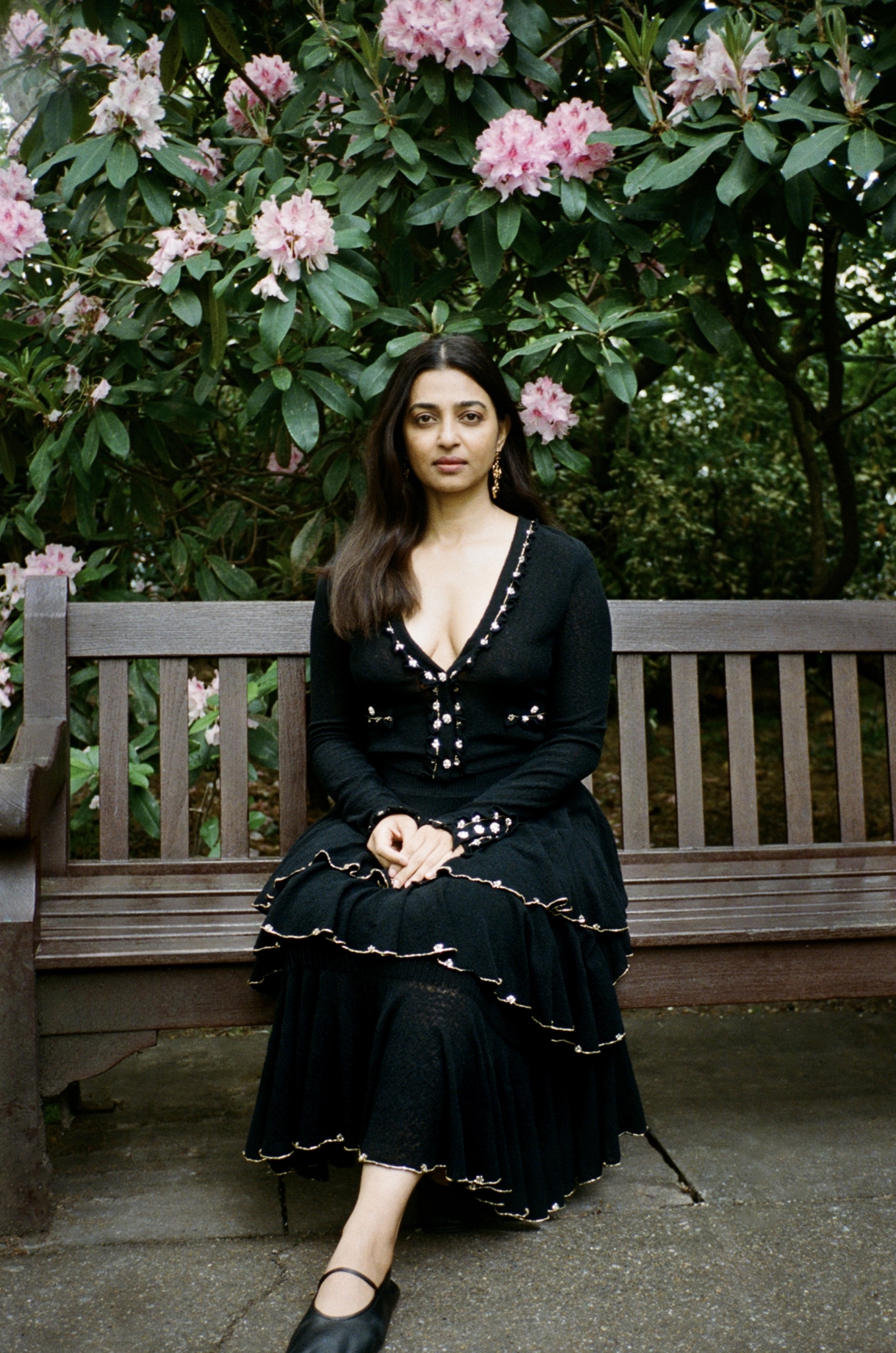
The actor joined us to discuss moving beyond acting, her affinity for rebellion, her role in Sister Midnight and why she’s embracing chaos.
Radhika Apte can’t stop. The actor and writer (and director and dancer, and just about anything else she sets her mind on becoming) has just returned from a six-week shoot in India, and has jumped straight into promoting Karan Kandhari’s acclaimed indie Sister Midnight, in which she stars. “I’m a workaholic,” Apte confesses. “I don’t know why you feel like you have to make sure that life hasn’t changed, or that you can still ‘do it.’ Who are you trying to prove that too? I should have taken six months off. I was writing, so I could have done that.”
When Apte talks about her life changing, she’s referring to her latest and most testing role yet: motherhood. “I haven’t taken a week off since I gave birth in December,” she says about the arrival of her baby girl at the end of 2024, an event which coincided a little too close to comfort with a work deadline. “I submitted a draft of writing on a Monday night and on Tuesday I went into emergency labour. No breaks.”
Despite a brief stint of burnout (she says that after today she’s taking a well-deserved week off), Apte maintains that juggling her work life and parenthood is nothing she can’t handle, with her daughter having accompanied her on her recent trip to India. “She’s a very patient girl,” she says affectionately. “It was hectic for her. It gave me and my partner confidence that we could do this together. I have a great support system. I didn’t feel like I lost my identity even once since giving birth.”
Apte’s role in the wickedly funny and refreshingly experimental Sister Midnight is similarly about the struggle of balancing the many facets of the self. Set in Mumbai, she plays housewife Uma, newly married after being arranged to the meek and inexperienced Gopal (Ashok Pathak).
Uma is a societal maverick: fiercely protective of her agency and almost childlike in her resistance of established social norms and hierarchies; of the label of “wife” and all the restrictions it contains. As she struggles against the expectations of the conservative community around her, she undergoes a strange transformation. “It’s not about a woman trapped in a marriage, really,” says Apte about the multitudes her character contains. “It’s about a spirit trapped in a structure.”
Not unlike Uma and Sister Midnight—a surreal, tonally malleable film which avoids any hard-boiled definition—Apte herself refuses to be boxed in, admitting to having a rebellious streak that dates back to when she was a child, where she first learnt the meaning and power of the word ‘no.’ “I’ve never done what doesn’t make sense to me,” she says, proudly. “I’ve always been the difficult one. The one who rebels against everything.”
Gearing up to write and direct her first feature, as well as an upcoming TV show, Apte joined me to discuss moving beyond acting, her affinity for rebellion, her role in Sister Midnight and why she’s embracing chaos.
Luke Georgiades: Looking at Sister Midnight through the lens of being the mother of a daughter, does it change the way you see Uma at all?
Radhika Apte: Not the character, per se. But there’s a funny thing: there was originally a shot at the very end of the movie where you find out Uma’s pregnant. And we took it out. And then I got pregnant. It went from fiction to reality.
LG: Were you a rebel growing up, like Uma?
RA: I was, actually. Early on some of mine and my friend’s parents got together and decided they didn’t want to send their children to do conventional schooling, so they started a school themselves. It’s very popular now, but at the time it was unconventional. They encouraged us to ask ‘why’? We didn’t blindly follow things. I’ve kept that with me my whole life. I’ve never done what doesn’t make sense to me. I’ve always been the difficult one. The one who rebels against everything. In the culture it becomes something like, ‘do you have to be difficult? Do you have to say no?’ Well, yes, because it doesn’t make sense. ‘Can not some stuff just be, the way they’ve always been?’ No, it can’t. It’s exhausting to keep fighting for that. In the film industry, especially, that reputation can follow you. I’ve always been outspoken. I’m not afraid of saying things there and then. A male actor, a “superstar”, has come to set late before, and I’ve gotten up and clapped as they’ve arrived and said “fucking hell, why aren’t you here on time?’
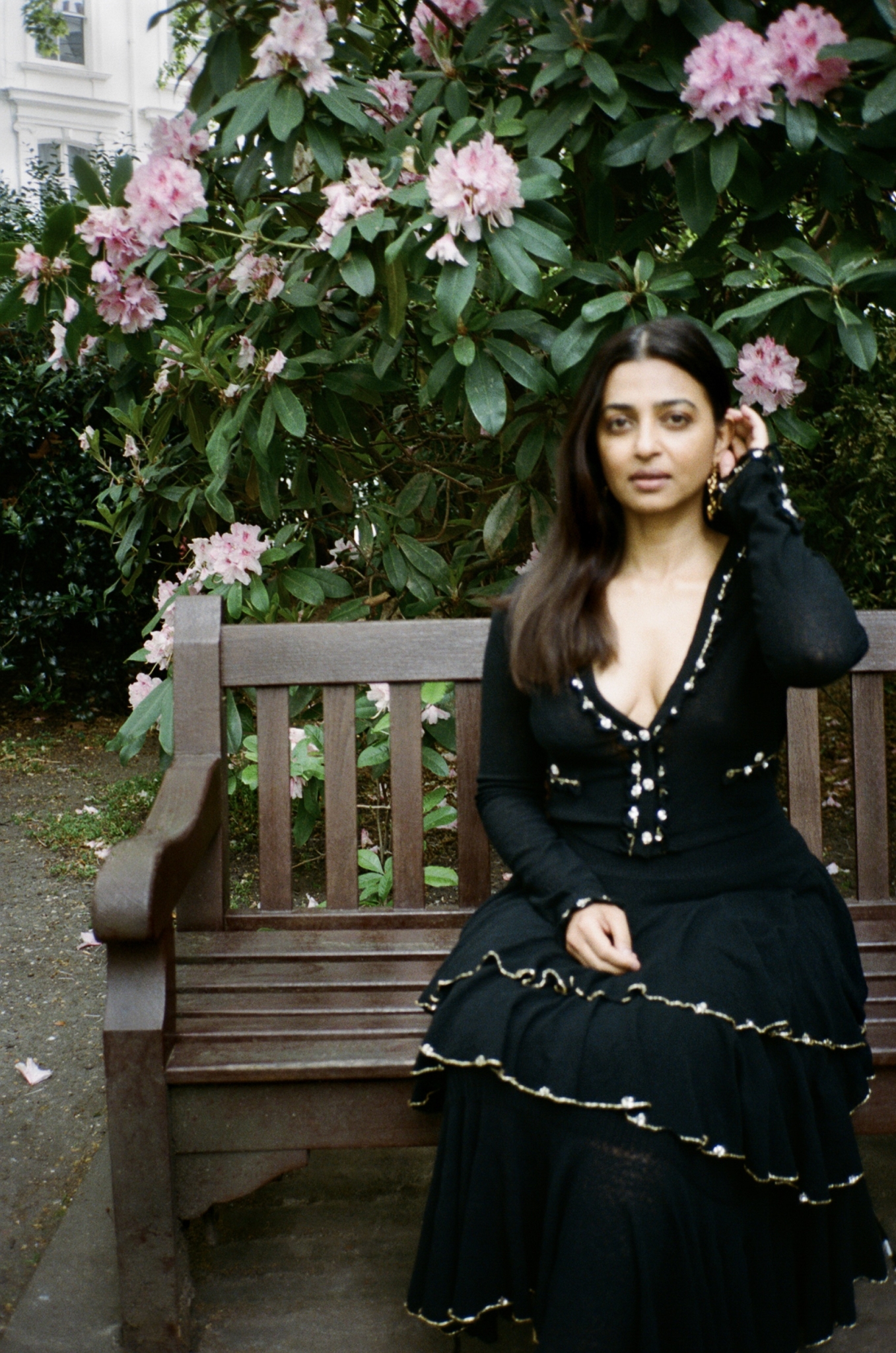

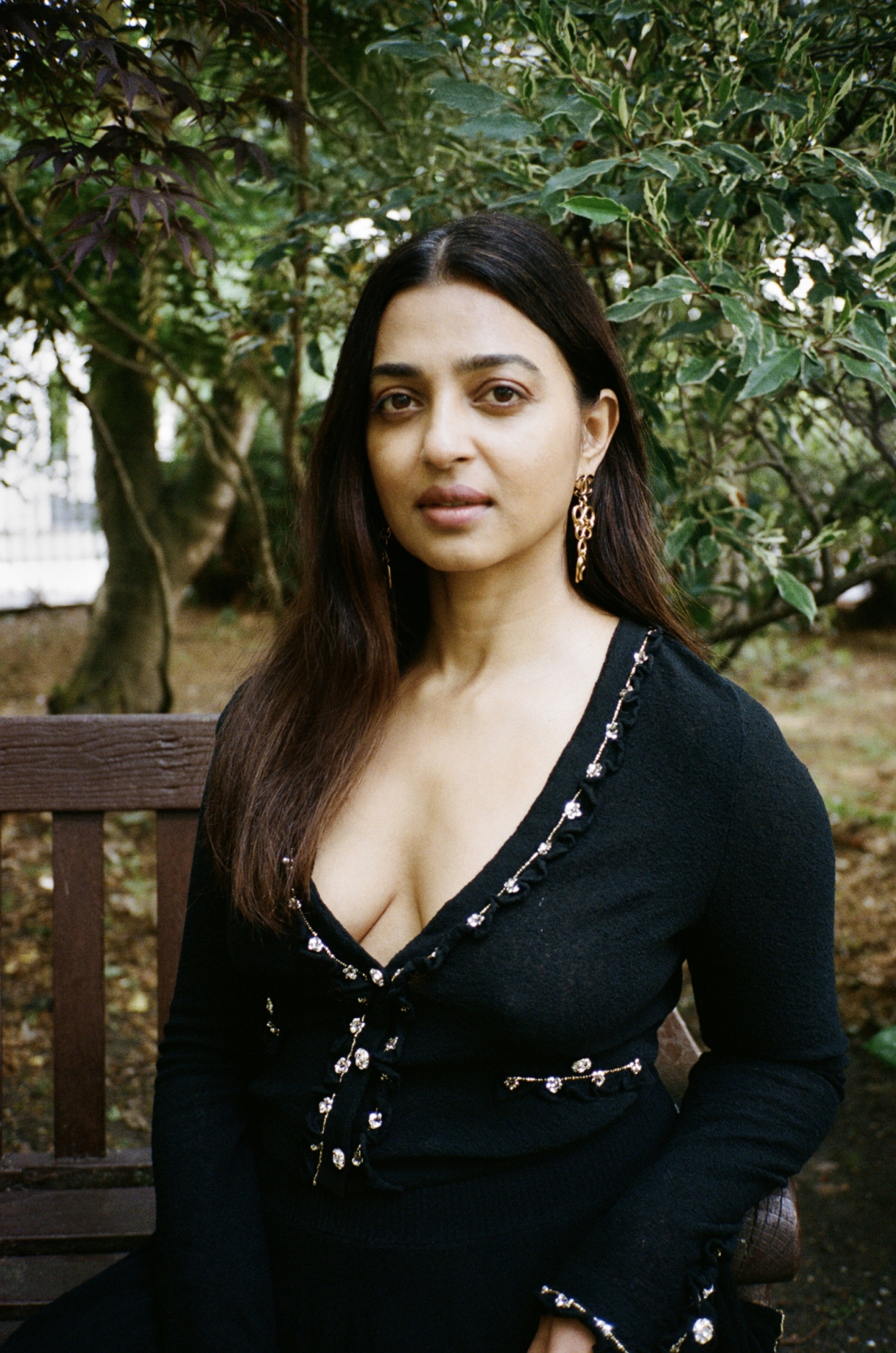
LG: Do you find yourself picking your battles carefully?
RA: It got to the point where people were scared that I would never get a job again, behaving like that. So I realised that I do have to pick my battles, because I can’t make change happen unless I have power, and to have power I have to climb to a certain place. So I bite my tongue. I’ve seen things happening around me which I don’t approve of, I’ve let people walk all over me, I still do, sometimes, because I needed the job at the time. But I don’t forget that when I do have the power, I need to stand up. I’m trying to strike a balance. Even when I choose my battles, I make sure I make my point heard.
LG: Do you worry about what those outside of the industry might think of that?
RA: Everyone’s a hypocrite. They really are. That doesn’t mean you don’t have a value system. But it’s not always possible for the world to behave to the standard of your value system. Sometimes you have to play the game before you can make a change. People have strange expectations of those with platforms. On the other hand, sometimes it’s nice to be called out. When you have millions of followers, the choices you make do matter. It’s important to be aware of that.
LG: Did it take a long time to get to grips with that responsibility as your stardom rose?
RA: I hate being famous. I don’t like to be recognised. I’m not a fancy person. I don’t like travelling in a car in London, I always take public transport. I own two pairs of shoes, because I don’t care much about clothes. I like to be that way. Having said that, I do like the fact that if I give an interview, people will read it, and might come up to me and say that something I said made them think. It makes me feel powerful and responsible. That part, I really like. Being popular and making money is a short term goal. Work and my personal life need to go hand in hand—If I don’t grow with my work, it’s a waste of my time. I want to be challenged, in my work, in my opinions, in everything.
LG: Is that one of the reasons you’ve started to pivot into writing and directing?
RA: I never thought I’d ever write, but I was frustrated about the roles that were coming my way, and I thought, well, what about the subjects I want to explore? So I started writing, and I found out how much I love it. I’m getting better. I’m disciplined. I work at it every day. I’m writing a show right now, and I really don’t want to be in it. I just want to direct it. But the platform we’ve gone to is insisting I also star. It’s sad. But the time it’s taking, I’m hoping they might have to eventually just cast someone else in the role. I don’t want to perform. I’d like to direct and write. I don’t know how good at it I am, but I’d like to try it and see. I’m a bit tired of acting. I don’t enjoy it like I used to. The goal now is to pick just a few projects for acting.
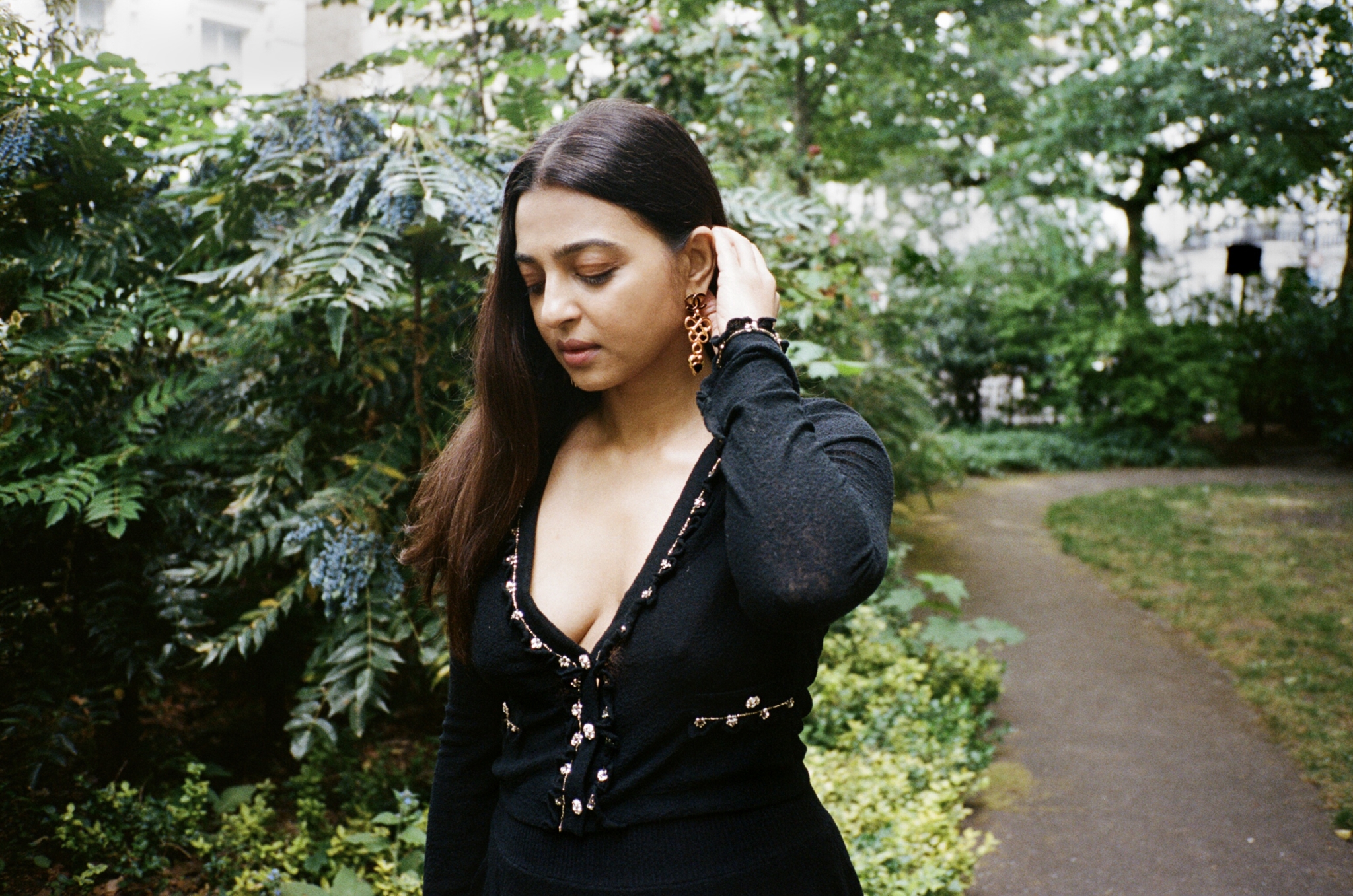
“I’ve never done what doesn’t make sense to me. I’ve always been the difficult one. The one who rebels against everything. In the culture it becomes something like, ‘do you have to be difficult? Do you have to say no?’ Well, yes, because it doesn’t make sense. ‘Can not some stuff just be, the way they’ve always been?’ No, it can’t. It’s exhausting to keep fighting for that.”
Radhika Apte
LG: It’s interesting that you don’t seem to have that fear of failure like so many of us do when it comes to trying new things.
RA: I’m not afraid of failing at all. I’m not afraid of people telling me my film was crap, or my performance was shit. It’s fine. It’s part of the whole journey. As an actor, you fail all the time. We need to normalise it. We fail more than we succeed. I always like to work with people who allow me the freedom to fail. If I’m afraid then I’ll never take any risks.
LG: Are you curious about how Sister Midnight will be received in India?
RA: I’m curious. The few people who have seen it in India have loved it. But at the end of the day, I normally don’t think much about what’ll happen when a film comes out. I do it for the process. I don’t care if my film doesn’t do well at the box office. I did my part. I barely know which of my projects have failed or succeeded. I detach from it all quite quickly.
LG: You mentioned getting movie offers that you felt weren’t aligned with your growth as a person. What did you feel was different about Sister Midnight?
RA: I loved how free and crazy and bizarre the script was. It really doesn’t follow the rules. It changes direction so late in the game. Yet, it made complete sense to me..
LG: Karan has mentioned not originally designing this as a political story. What’s your interpretation of what the film is trying to communicate?
RA: To me, Uma’s genderless. It’s not about a woman trapped in a marriage, really. It’s about a spirit trapped in a structure. That’s why it’s such a feminist story. Karan is an egalitarian. Every character is treated with equal empathy. Uma is pure innocence. She’s like a child, her curiosity, her aggression. She’s feral like an animal. It’s amazing to not box her in a single category. Who is she? Is she a woman, a child, an animal, or a creature? It doesn’t matter. A spirit is malleable. You can’t define her. Just like you can’t define the film.
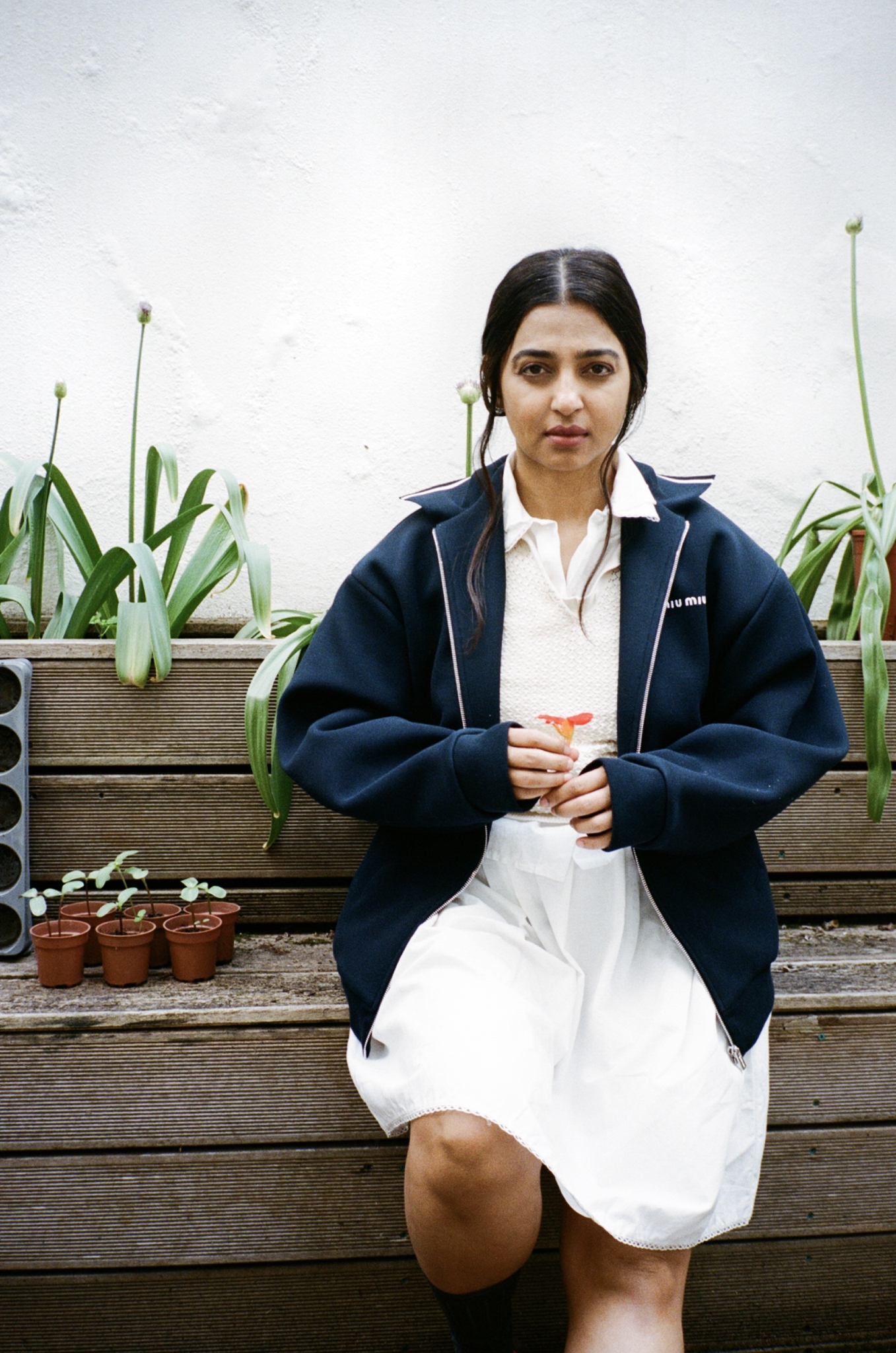
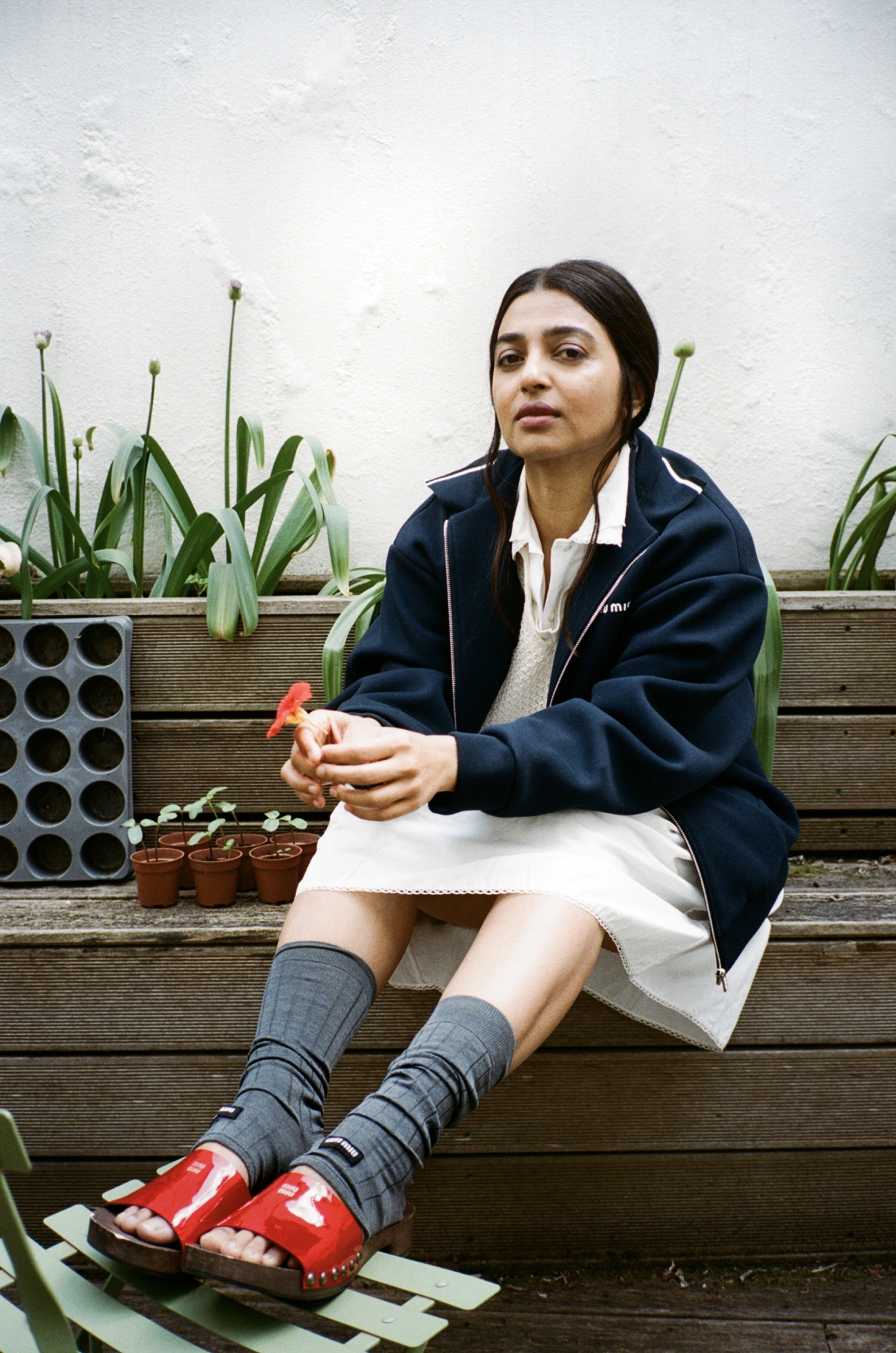
LG: It’s a very funny film at times, a lot of people don’t realise how hard comedy is. How did you get into that zone?
RA: We had to find our own rhythm. I’m used to breaking a character down in a cerebral way. Every action has a thought process. But I would ask Karan these questions about why she would be doing certain actions, and he’d shrug and say, ‘I dunno’ [laughs]. He didn’t want to explain it. So we had to de-intellectualise everything. I know as much backstory as the audience does. What was important to Karan was that the character was rooted in movement. He wanted her to move and react in ways that weren’t natural for me at first—It took me a while to get used to it, but then I felt really light. Then I could start using my instincts, and start really understanding the character. The comedy was a result of that. It’s not often in film you get to express using the entire body. That’s theatre. That’s dance. I’ve been doing theatre for a long time and I’m a contemporary dancer. I’ve studied choreology. I love working with my body.
LG: The poster for the film suggests a parallel to Taxi Driver. What do you think your character has in common with Travis Bickle?
RA: [Laughs] I just saw that yesterday! They’re both misfits, and outlaws. Their trajectories are very different, but I think it’s that.
LG: Do you remember the first time you fell in love with performing?
RA: I did a film called Gho Mala Asia Hava (2009). It was one of my first films. There’s one scene where I have to fall in love with this guy. My character doesn’t like him very much. But he wants a cup of tea. She goes and gets him a cup of tea, and then he asks for something else, so she goes back. This happens around four times. And by the fourth time, she’s fallen in love with him. It was a one-shot, and the camera had to follow me back and forth as my character went from not liking this man to falling in love with him. And I fell in love with the camera instead. It was close to me the whole time. It felt like a companion. I’ve loved the camera ever since. It doesn’t intimidate me, it makes me feel comfortable. I like to write on film sets. I find it easiest to focus. I love having chaos around me.





